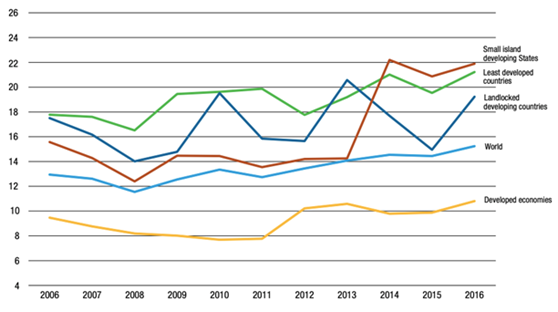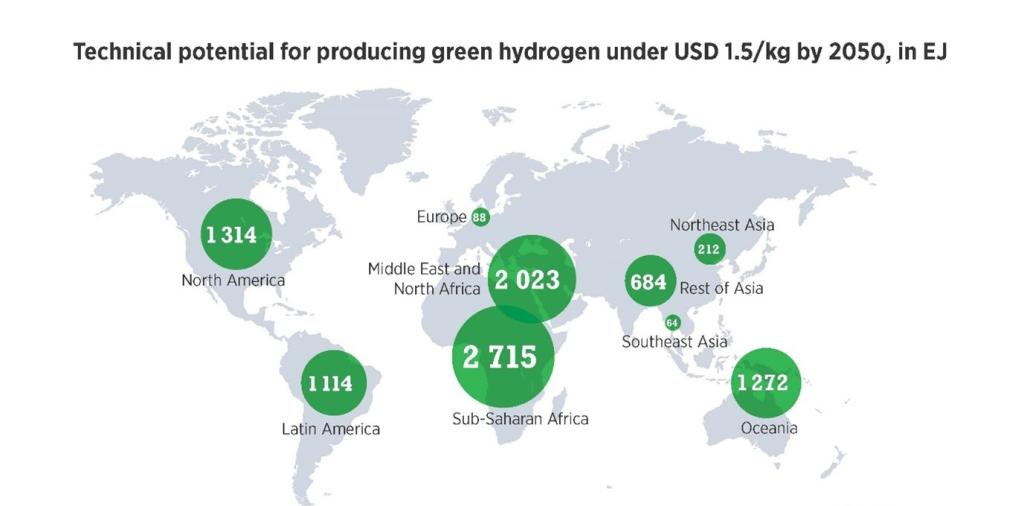By Connor Bingham and Ida Tang Mikkelsen, Article No. 107 [UNCTAD Transport and Trade Facilitation Newsletter N°98 - Second Quarter 2023]

© AdobeStock | Ship crane lifting cargo from truck to ship for export.
Effectively addressing the impact of increased trade costs on emerging market economies and less developed countries will be needed to ensure that the transition to scalable zero emission fuels is just and equitable.
Maritime decarbonisation and the importance of trade costs
The maritime ecosystem’s transition to scalable zero-emission fuels will have implications for global trade over the coming decades. While the shift will on the one hand lead to energy supply becoming more distributed, with related export opportunities for the producers of scalable zero-emission fuels, it will on the other hand mean transitioning to more expensive fuels, which will impact trade costs. Achieving this will be necessary to ensure that global trade effectively bears its environmental cost, which is required for trade to be sustainable. However, this will increase the price of freight globally, leading to a wide spectrum of impacts on several geographies, commodities and trade routes.
Understanding and addressing the diversity of these impacts on states, while optimizing the opportunities, will be needed to ensure that efforts to advance this transition are just and equitable. This July, important negotiations at the International Maritime Organization (IMO) negotiations for MEPC80 will see member states lay the groundwork for future policies to advance maritime decarbonization, whilst also ensuring that any disproportionate negative impacts on states are effectively mitigated.
Trade costs and the global economy
With more than 80% of global trade by volume and 70% of the value being transported onboard ships, the impact of cost changes to marine transportation will touch all aspects of the global economy. This is because the cost of transporting goods by sea affects trade costs alongside other factors such as policy barriers, customs procedures, technical barriers to trade, contract enforcement, information, exchange rate fluctuations, local distribution, as well as the legal and regulatory costs[1].
While the cost increase on higher-end consumer goods such as a pair of shoes is negligeable (No more than 1.5%), the macro-economic impact can indeed be significant for some states. Higher transport costs, all else equal, have the potential to impede a county’s ability to participate in the world economy and negatively affect economic growth. For example, SIDs, who are typically highly reliant on imports and exports in addition to being located far away from major trade routes, are particularly affected economically by high transport costs. Currently, SIDs (Small Island Developing States) and LDCs (Least Developed Countries) already pay around double what developing countries pay for the transportation of their trade (See figure 1), leaving them even more exposed to further increases in these costs.

Figure 1: UNCTAD, Review of Maritime Transport 2017
Increases in trade costs also have the potential to affect the relative price of goods depending largely on the type and value of the product, the volume of shipping, value-to-weight ratio as well as the specific transport requirements. In general, when comparing goods with a higher value per ton to those with a lower value per ton, goods with a lower value per ton, such as agricultural goods and industrial raw materials, are proportionally more affected by transport costs. For example, one report shows that shipping and insurance expenses accounted for 5.1% of the value of imported manufactured goods, while agricultural goods incurred 10.9% and industrial raw materials accounted for 24.1%.
Consequently, states who are more economically reliant on the export of agricultural goods and raw materials are more exposed to changes in fuel costs. This disproportionately affects developing countries, who are typically more reliant on primary products in terms of share of exports and GDP.
For certain regions these levels of cost increase can represent serious concerns such as raising the price of imports and weakening regional food security, as has been the case with East Africa during the Covid-19 pandemic. Consequently, special attention should be paid to regions which are uniquely and acutely exposed to a global increase in transport costs to ensure that no-one is left behind by the transition to zero emission fuels.
Securing a just and equitable transition through effective policy
Due to the need to urgently decarbonize international shipping, not least to secure the mere survival of climate vulnerable states, and the reality of disproportionate negative impacts on some states, there is a need to explore policies capable of distributing the costs and benefits related to international maritime decarbonization. Without effective policy to address this, there is a risk of certain countries and regions being left behind without having a means to offset any disproportionate negative impacts caused by the transition to more expensive fuels.
Current negotiations at MEPC80 are attempting to lay the groundwork for a measure, or set of measures, capable of addressing these concerns. Proposals currently include mechanisms capable of distributing funds to more affected states to address the disproportionate negative impacts created by measures such as a carbon price or feebate system. This will also accelerate the price increase caused by a faster transition to zero-emission marine fuels.
It is worth remembering, however, that the eventual price increase of marine fuels will be needed for international shipping to curtail its emissions. In the current context, industrial countries like the EU and the US are proceeding with policies such as the EU-ETS (EU Emissions Trading System), Fuel EU Maritime and the Inflation Reduction Act, constituting opportunities for first mover countries and their industry. Going forward, a global response will be important to ensure that the revenue collected will benefit the Global South and countries located far from their markets.
Consequently, International Maritime Organization member states need to come together and create a solution that can both advance maritime decarbonisation, drawing in the fuel potential across the globe, whilst also ensuring that disproportionate negative impacts are alleviated for the worst affected countries.
Member states may also benefit from exploring other avenues to address the issue of trade costs, such as other tariff and non-tariff barriers to trade, improving port connectivity and trade agreements. Alongside upcoming IMO negotiations, these factors should also be considered as potential parts of the solution, due to their ability to also contribute towards the reduction of trade costs for developing economies.
Considering the opportunities
Lastly, despite the reality of increased trade costs for several geographies, the transition to zero-emission fuels will also lead to shifts in trade flows globally, particularly regarding the trade of energy. This means that for several countries, maritime decarbonisation represents a potential opportunity to engage more closely with international trade through the production and supply of scalable zero emission fuels.

Figure 2: IRENA (2022) Geopolitics of the Energy Transformation: The Hydrogen Factor
The potential to produce fuels based on green hydrogen like green ammonia, green methanol, or green hydrogen itself is largely skewed towards the global South and developing countries (See figure 2). This means that despite disproportionate increases to trade costs for these countries, for some advancing maritime decarbonisation will also create economic opportunities, which should be taken account of and ultimately explored and developed.
Conclusion
Progress at MEPC80 will be vital in ensuring a global approach to maritime decarbonisation where no-one is left behind. As such, it is our hope that member states of the IMO can come together and create a solution that takes account of the impacts of trade costs on states, whilst ensuring that international shipping does its part in tackling climate change.
[1] J.E. Anderson, E. van Wincoop, Trade costs, J. Econ. Lit., 42 (3) (2004), pp. 691-751




